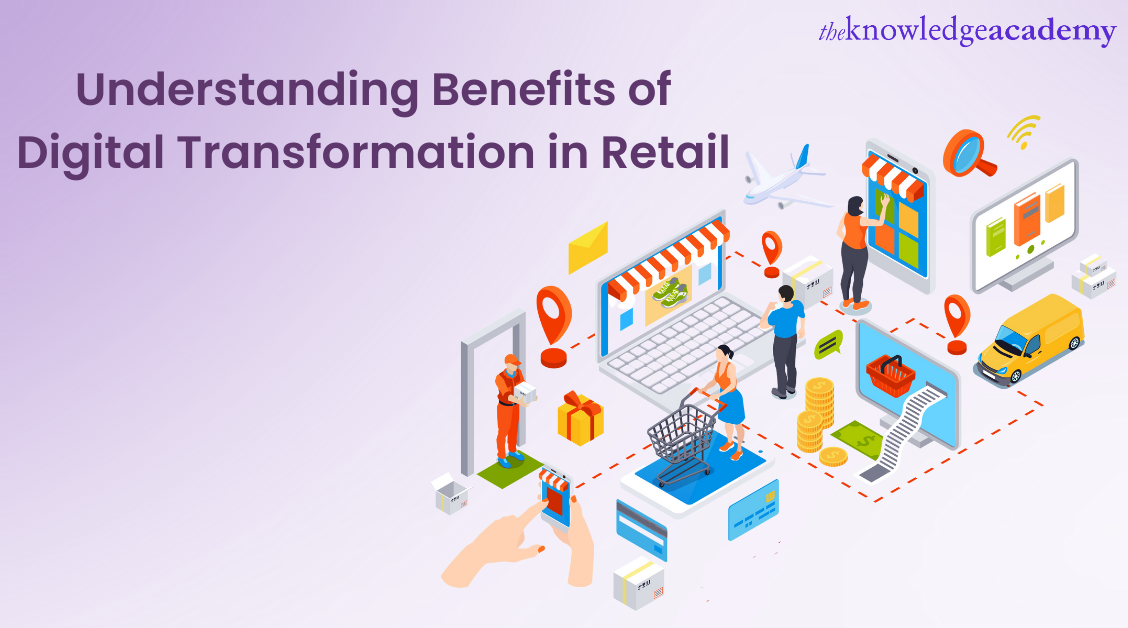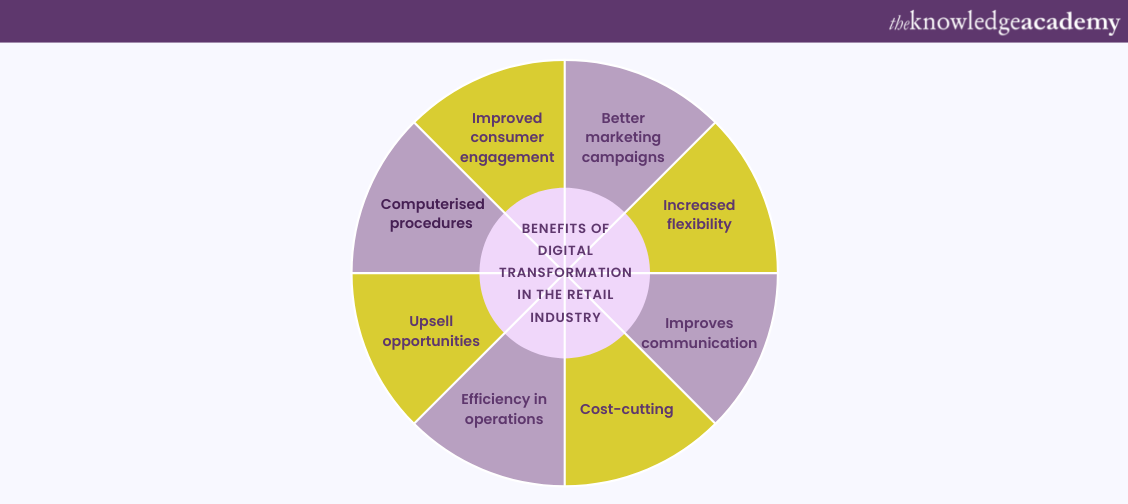We may not have the course you’re looking for. If you enquire or give us a call on 01344203999 and speak to our training experts, we may still be able to help with your training requirements.
We ensure quality, budget-alignment, and timely delivery by our expert instructors.

Over the past few decades, the retail landscape has seen a spectacular digital shift. From visiting retail establishments to making purchases online, E-commerce has come a long way in transforming the face of the retail industry. Digital Transformation drives change in the retail sector while evolving the customer journey. If you want to know the other Benefits of Digital Transformation in Retail industry, this blog is for you.
While on the one hand, Digital Transformation is helping the retail industry increase efficiency, revenue, and strong customer relationships; they are also facing many challenges. According to PwC’s study, with increasing digital Transformation, the sector is experiencing immense competition and is struggling to keep up with new technological developments. Let’s dive deep into understanding the Benefits of Digital Transformation in Retail that motivate the industry to battle these challenges.
Table of Contents
1) Understanding Digital Transformation in Retail sector
2) What are the Benefits of Digital Transformation in Retail sector?
a) Increased flexibility
b) Cost-cutting
c) Improves communication
d) Efficiency in operations
e) Improved customer engagement
f) Better marketing campaigns
g) Computerised procedures
h) Making the most out of upsell opportunities
3) Challenges of Digital Transformation in Retail sector
4) Conclusion
Understanding Digital Transformation in Retail sector
The rise of the pandemic has largely affected the retail industry and has increased operational complexities for businesses. Therefore, Digital Transformation in Retail has helped address customer needs and preferences, reduce costs, streamline work processes, and increase efficiency.
Retailers have started adapting to the new ways of Digital Transformation, as detailed in the Digital Transformation Case Study Guide, to increase profits and form innovative business models. Digital Transformation is necessary, as technology helps execute business operations and streamline the supply chain, customer relationships, and inventory management.
Digital Transformation has caused higher expectations from consumers, and there is a significant surge in demand for infamous goods. Retailers have shifted to Digital Transformation to maintain their customer relationships and give better customer experiences than their competitors.

What are the Benefits of Digital Transformation in Retail industry?

Implementing Digital Transformation in Retail sector requires a well-drafted strategy to produce successful business outcomes. There are several proven benefits of Digital Transformation in the Retail sector, which can generate better revenue and enhance customer relationships. Let’s take a look at a few of them:
1) Increased flexibility
Digital Transformation allows retailers to rely on more than one channel. Social media apps and mobile apps are alternatives to increase flexibility for customers to have access to their demands at ease. After the pandemic, people are increasingly shifting to online purchasing. Unlike traditional times, E-commerce has allowed more people to interact with businesses using several channels. Additionally, creating a smooth shopping experience for customers, thereby increasing customer satisfaction.
2) Cost-cutting
Digital Transformation solutions reduce manual tasks in Inventory Management, which helps cut costs and increase precision. Additionally, technologies like Cloud Computing Services provide flexibility to manage costs without needing further hardware expenditures.
3) Improves communication
Chatbots, social media, websites and mobile apps have proved to be an easily accessible medium to communicate with consumers. Retailers can directly understand customer demands and customise brand messages based on their preferences. This allows for building better connections with the customers.
4) Efficiency in operations
Cloud technologies play a significant role in streamlining operations within the organisation. As a result, retail staff with Digital Transformation jobs can efficiently manage time to fasten their processes. It also helps customers get quick responses from customer support.
5) Improved customer engagement
Digital transformation has replaced in-store communication with online interaction leading to better experience for customers. It has given customers surplus facilities, thereby increasing engagement like never before.
6) Better marketing campaigns
Digital Transformation solutions help you understand customer demands and gather accurate data to create personalised marketing campaigns. Brands can choose from various marketing options like testimonials, money-back guarantees, and discount coupons to provide a personalised experience to their customers.
7) Computerised procedures
With the help of automation, business operations are made easier. The evolving digital technologies allow us to run tasks efficiently and generate better revenue.
8) Making the most out of upsell opportunities
Upselling is still one of the top advantages of Retail Digital Transformation because it is a quick and simple approach to increasing sales. Upsell opportunities help you boost revenue using digital tools, saving time and increasing quick wins for retailers.
Challenges of Digital Transformation in Retail sector
Implementing Digital Transformation in the retail industry has several drawbacks; let’s talk about a few:
1) Adapting to new changes
Change in any form is difficult to adapt to as it involves new procedures and mediums. You are likely to deal with the gaps in understanding the new technologies. Not every employee will be able to adapt to the new changes immediately.
2) Absence of competent experts
Finding qualified staff is one issue with Digital Transformation in the Retail sector. It calls for specific knowledge in fields including Machine Learning, Data Analytics, Artificial Intelligence, Cloud Computing, Mobile Development, Cybersecurity, etc. An organisation may not always have access to such talent, necessitating outside resources for knowledge.
3) Difficulty in comprehending Digital Marketing strategies
It is not easy to implement a new Digital Marketing strategy. Many people can become confused when presented with the idea of an expanding number of channels where product ranges must be carefully handled across numerous channels. A Digital Transformation strategy involves people from different domains with different skill sets, so it might take time for people to understand and implement the new process.
Ready to lead your company into the future? Check out our recommended Digital Transformation Books and equip yourself with essential knowledge for success.
Conclusion
Digital Transformation in the Retail sector is growing quickly to keep up with customer expectations. It has a lot of benefits for retailers who have embraced technology to create an engaging and seamless customer experience. Similarly, Digital Transformation in Higher Education is also gaining momentum to enhance learning environments. We hope this blog gives you a clear understanding of Digital Transformation's importance in the retail sector and its challenges.
Get Interview-Ready – Explore Essential Digital Transformation Interview Questions Today!
Upcoming Business Improvement Resources Batches & Dates
Date
 Digital Transformation Certification
Digital Transformation Certification
Thu 27th Mar 2025
Wed 14th May 2025
Wed 3rd Sep 2025
Wed 3rd Dec 2025






 Top Rated Course
Top Rated Course


 If you wish to make any changes to your course, please
If you wish to make any changes to your course, please


